Introduction
In the rapidly evolving landscape of cloud computing, managed services in Azure have emerged as a pivotal solution for organizations seeking to optimize their IT operations. By outsourcing critical functions to specialized providers, businesses can leverage expert knowledge and advanced technologies to enhance their cloud infrastructure management.
This article delves into the multifaceted benefits of Azure managed services, highlighting their role in improving operational efficiency, security, and compliance. It also addresses common misconceptions surrounding these services, emphasizing their applicability across various organizational sizes and needs.
As the demand for cloud solutions continues to surge, understanding how to select the right managed services provider becomes essential for organizations aiming to achieve sustainable growth and maintain a competitive edge in the digital era.
Defining Managed Services in Azure: An Overview
Managed offerings in Microsoft's platform refer to the strategic outsourcing of specific IT functions to a specialized third-party provider within the framework. This model enables organizations to utilize expert knowledge and advanced technologies, effectively managing their infrastructure. Managed services for Azure include a wide array of critical functions, such as resource monitoring, management, and optimization of Azure assets.
By adopting this approach, businesses can concentrate on their core objectives while relying on proficient professionals to oversee their online operations. The execution of controlled offerings not only improves operational efficiency but also reduces risks and ensures compliance with industry standards. With a hopeful view for the market of managed services for Azure, fueled by rising demand for online solutions and digital transformation efforts, organizations are acknowledging the significance of these offerings.
For example, as Google Cloud’s IaaS solution increased by 63.7%, it emphasizes the expanding environment of online offerings. A significant example is Drift, which successfully lowered its yearly expenses for online storage by $2.4 million through efficient oversight solutions, demonstrating the concrete advantages these options can offer. As organizations continue to adopt cloud technologies, the function of managed services for Azure in Microsoft’s platform becomes increasingly essential for attaining sustainable growth and competitive advantage.
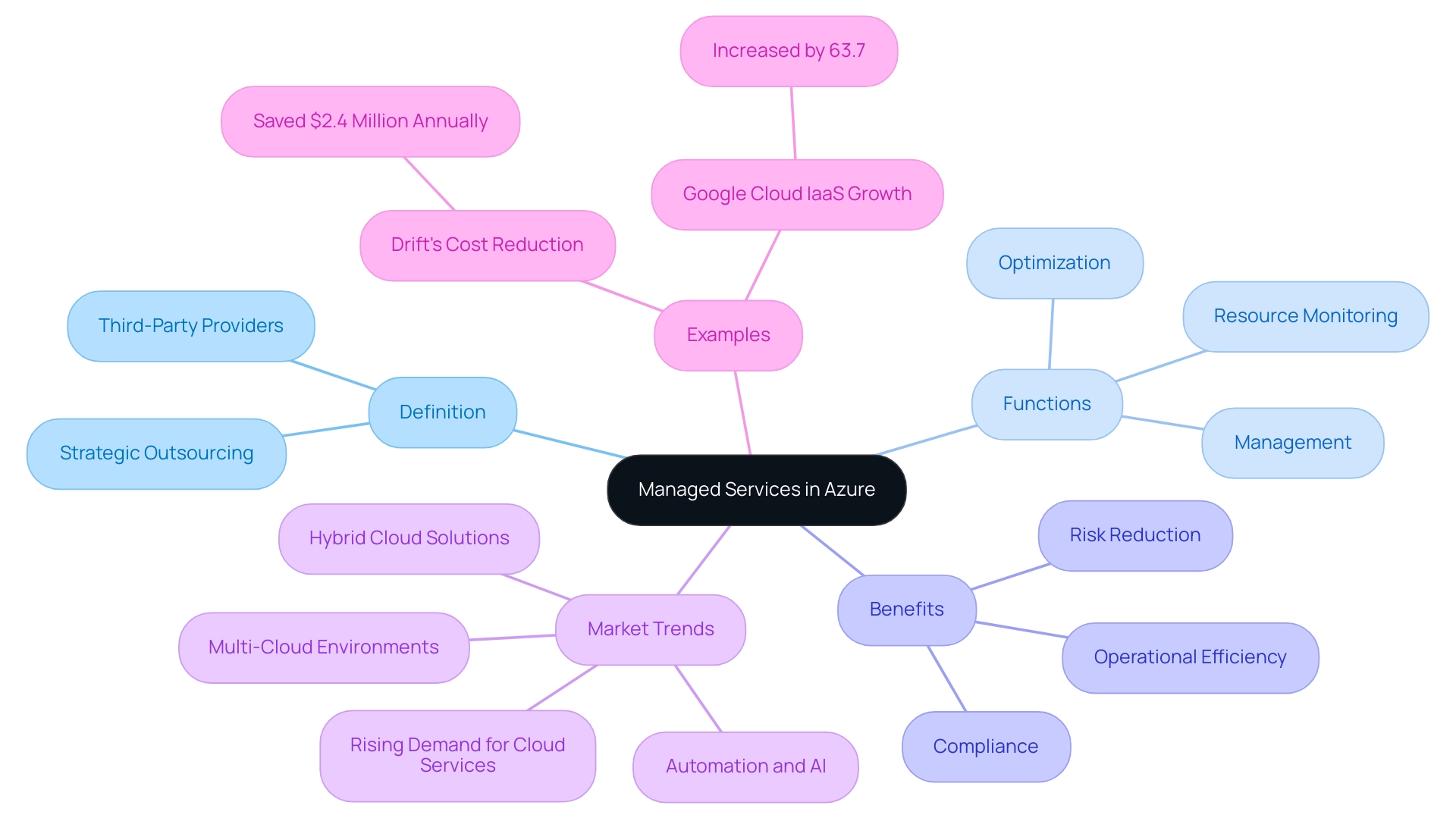
Key Benefits of Azure Managed Services: Enhancing Efficiency and Security
The tactical implementation of cloud solutions offers many benefits, especially in areas of improved security, operational efficiency, and cost reductions. A significant aspect is the execution of advanced security protocols and compliance measures by providers, which play a vital role in protecting sensitive data and ensuring adherence to regulatory standards. Furthermore, outsourcing management tasks allows organizations to streamline operations, alleviating the workload on internal IT teams.
This enables them to concentrate on strategic initiatives rather than being bogged down by routine maintenance activities. Recent advancements, such as the introduction of the new Premium tier of Azure Kubernetes Service, underscore Azure's commitment to enhancing its offerings. In light of current trends, with 45% of UK businesses planning to increase IT spending by 10-20% in 2023, the focus on optimizing resource usage through managed services for Azure becomes increasingly important.
Such optimization not only enhances operational efficiency but also leads to significant cost savings, as organizations reduce their reliance on extensive in-house expertise. According to recent insights from Veeam, half of surveyed businesses affirm that the cloud is integral to contemporary data protection strategies. Additionally, demographic data reveals that the majority of users are aged between 25 and 34, with nearly 26% in the 15-24 age group, indicating a younger, tech-savvy user base.
Furthermore, a case study on outsourcing patterns in supervised operations reveals that 78% of international firms trust their outsourcing associates, emphasizing the significant attractiveness of outsourcing for MSPs. Together, these benefits highlight the essential function of cloud-based supervised offerings in allowing organizations to leverage the complete capabilities of the platform efficiently.
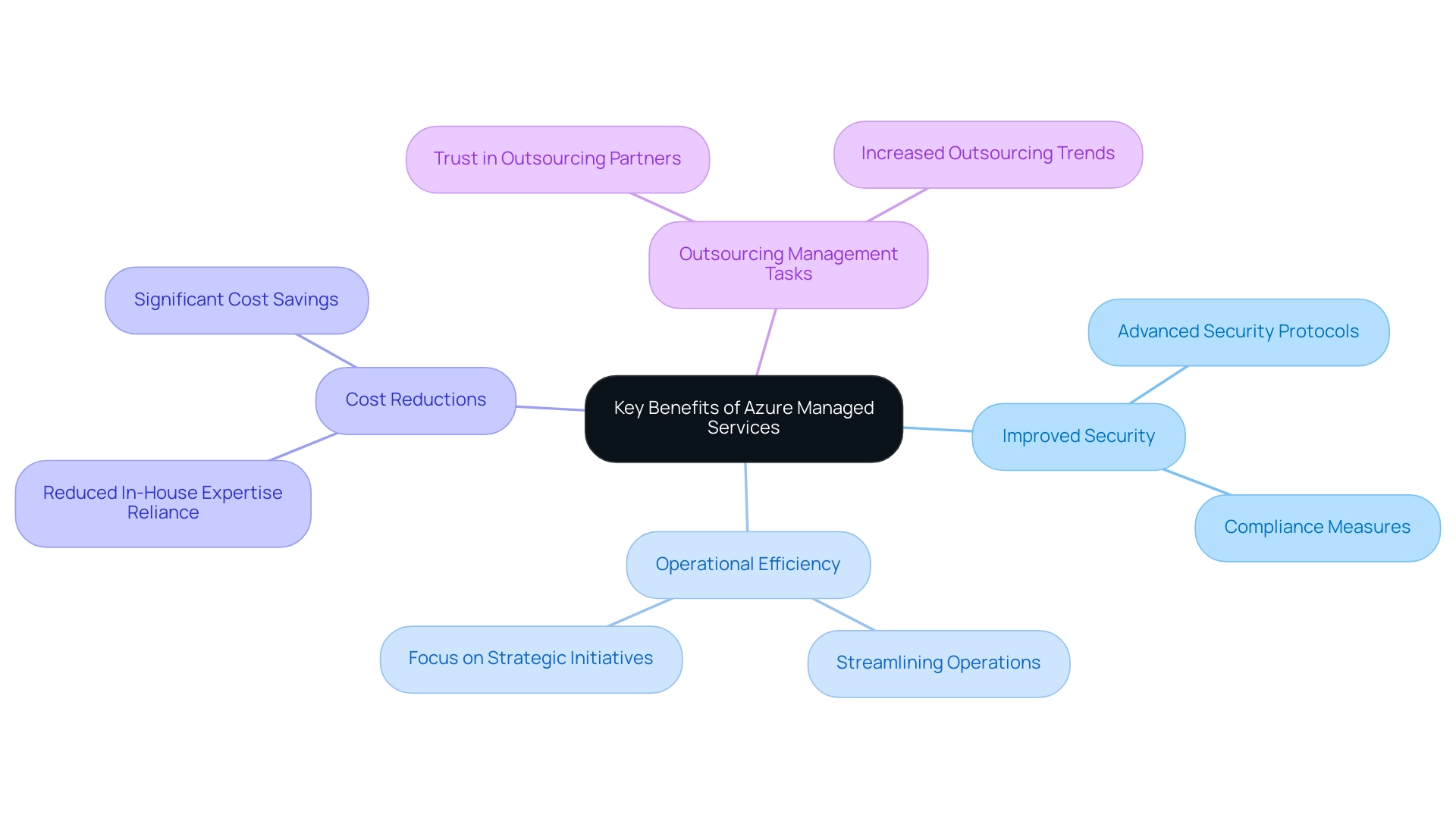
The Role of Managed Services in Effective Azure Cloud Management
Managed services for Azure are essential for optimizing cloud management, as they provide a framework for continuous monitoring, support, and resource optimization. By leveraging advanced analytics and monitoring tools, managed providers can assess system performance and security in real-time, enabling early identification and mitigation of potential issues. This proactive approach encompasses a wide range of support options, from troubleshooting to strategic resource allocation advice.
Optimization efforts ensure that cloud resources are utilized effectively, thus enhancing performance and reducing operational costs. The importance of these offerings is emphasized by recent trends showing that the controlled solutions sector is poised for considerable expansion from 2022 to 2032, especially in fields like data center administration and network support. Notably, Accenture's recent acquisition of Linkbynet for $250 million exemplifies the increasing investment in managed services.
Additionally, the U.S. and Western Europe account for 82% of the world’s computing services, highlighting the market's significance. Moreover, a recent survey by Veeam highlights that:
- 'The online storage plays a crucial role in today’s data protection strategy,' as indicated by half of the participating businesses.
By incorporating managed services for Azure into their cloud approach, organizations can significantly improve their management capabilities, ensuring alignment with broader business goals while addressing evolving data security challenges.
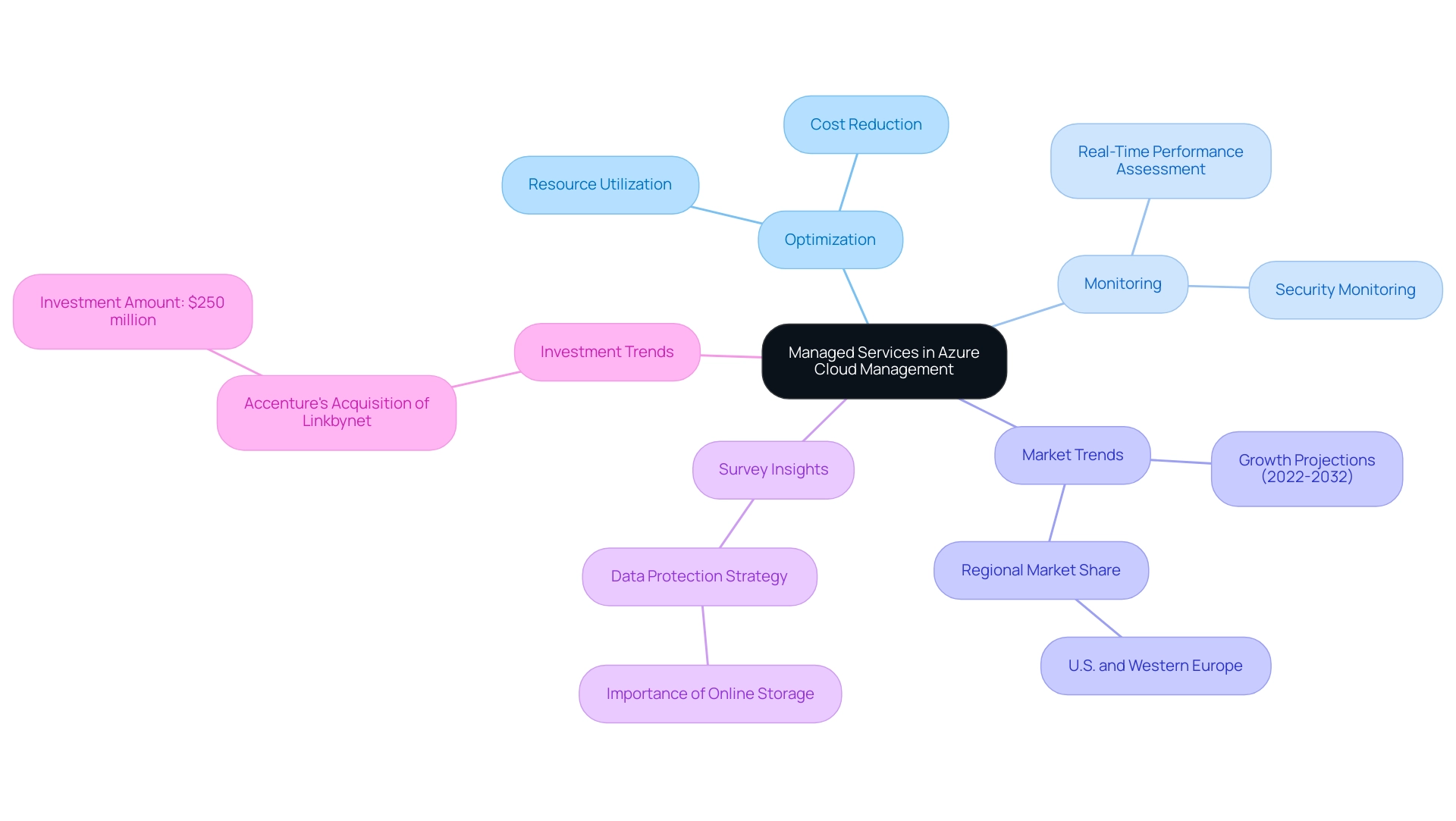
Debunking Myths: What Managed Services for Azure Are Not
Numerous myths persist regarding managed services for Azure that warrant clarification. A common belief is that using such options results in a total loss of control over the IT environment. Contrary to this notion, organizations can maintain significant oversight and customize their managed services for Azure to align with their specific operational needs.
Furthermore, it is a widespread misunderstanding that support offerings cater exclusively to large enterprises. In reality, businesses of all sizes can effectively utilize managed services for Azure, particularly as they scale and adapt to changing market demands. Moreover, there is a tendency to perceive administered offerings as uniform solutions.
However, reputable providers of managed services for Azure typically offer customized options, allowing organizations to select and modify solutions that best address their unique requirements. This flexibility is essential, particularly given that if one third-party provider requires a contractual minimum commitment, there are many others that do not, making offerings more appealing to those who prefer to pay only for what they utilize without long-term obligations. As Chris Tozzi observes in his examination of cloud-native tools, questioning how they set themselves apart from cloud-compatible alternatives, this emphasizes the significance of customization and control in overseen solutions.
Moreover, the case study named 'Having the Wrong Billing Model' demonstrates how MSPs that enforce minimum commitment terms may discourage potential clients who desire flexibility, strengthening the case for Azure-hosted solutions. As organizations investigate administered offerings, grasping these misunderstandings is crucial for educated decision-making, guaranteeing that they can fully utilize the benefits of online solutions while maintaining necessary control.
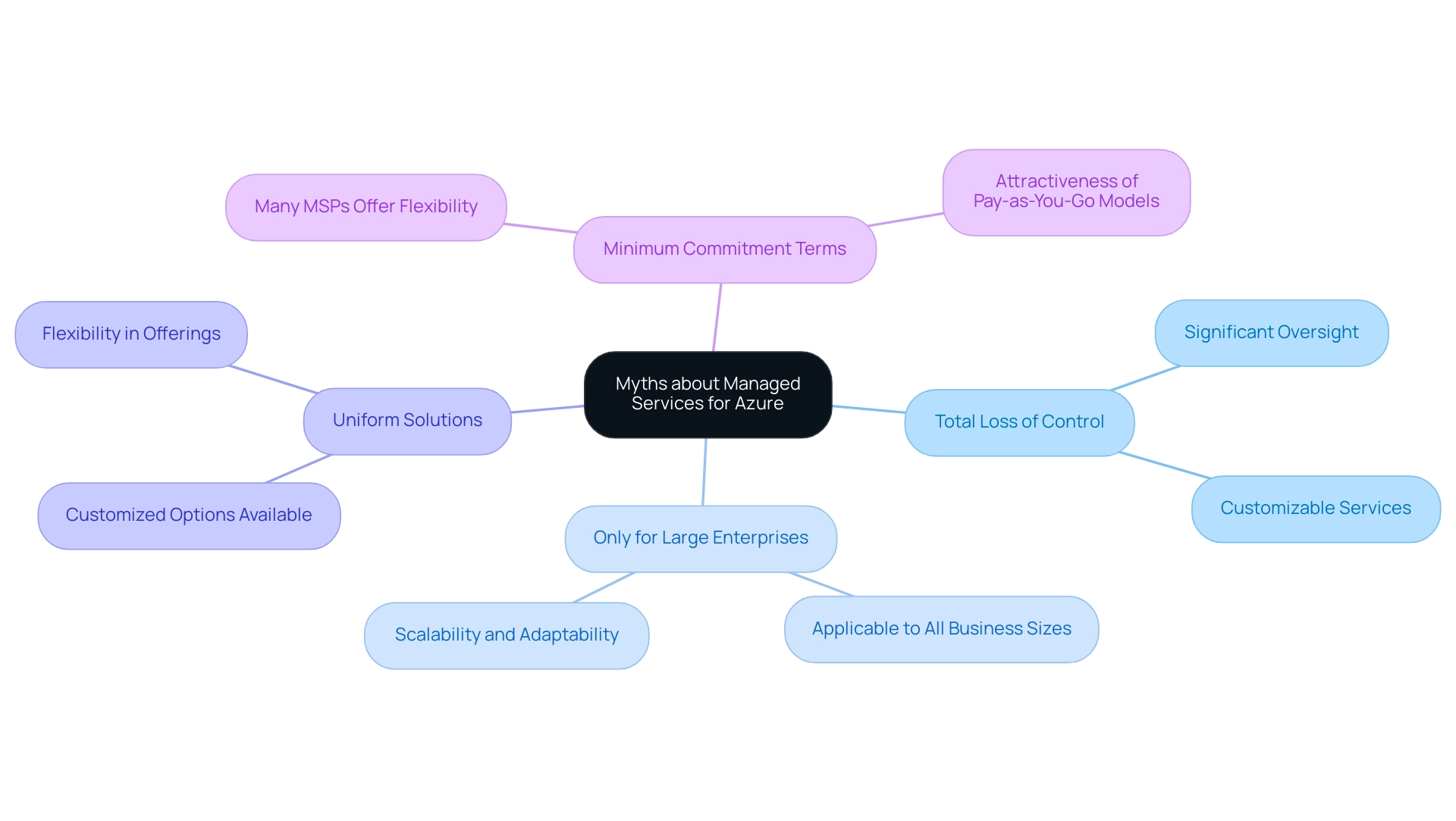
Choosing the Right Managed Services Provider for Azure: Best Practices
Selecting the appropriate provider for managed services for Azure necessitates a strategic method based on best practices. First and foremost, organizations must evaluate the provider's expertise and experience specifically with Azure to ensure they offer managed services for Azure and possess the skills necessary to effectively manage the cloud environment. Customizable solutions are also essential, as they enable providers to adapt offerings to the unique requirements of the business.
Furthermore, organizations should rigorously assess the provider's support capabilities and response times; rapid issue resolution is critical, especially considering that downtime can cost businesses between $137 and $9,000 per minute. This statistic underscores the urgency of selecting a provider that can respond swiftly to issues. As noted by SysGroup, collaboration with managed services for Azure empowers businesses to optimize their IT infrastructure to support growth and innovation.
Furthermore, the case study named 'Evaluate Compute Requirements' emphasizes the significance of comprehending instance types, scalability, and containerization to guarantee effective workload performance, which can greatly improve resource utilization when choosing a provider. Lastly, examining a provider's track record through customer satisfaction metrics and testimonials offers invaluable insights into their reliability and quality of assistance. Notably, the recent acquisition of Linkbynet by Accenture for $250 million reflects current trends in the managed services landscape, emphasizing the importance of strategic partnerships.
By adhering to these best practices, organizations can make informed decisions that significantly enhance their strategies for managed services for Azure.
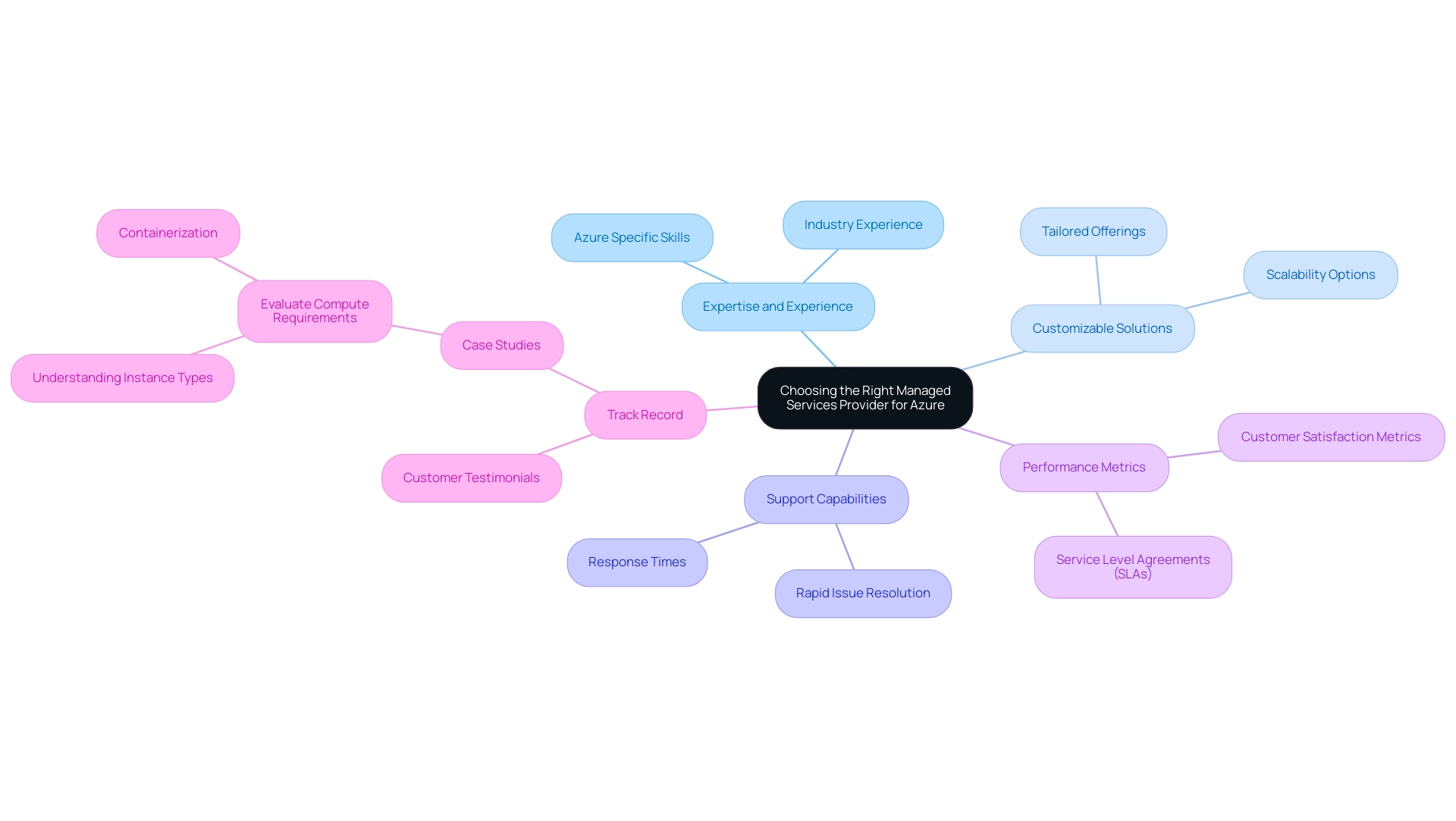
Conclusion
The exploration of managed services in Azure reveals a robust framework for organizations striving to enhance their IT operations amidst the complexities of cloud computing. By outsourcing critical functions to specialized providers, businesses can not only streamline their processes but also tap into advanced security measures and compliance protocols essential for safeguarding sensitive data. This strategic approach allows internal teams to focus on core initiatives, driving operational efficiency and cost savings.
Furthermore, the article dispels prevalent myths surrounding Azure managed services, clarifying that these solutions are not solely for large enterprises but can be customized to meet the diverse needs of organizations of all sizes. The flexibility offered by reputable managed service providers ensures that businesses can maintain control while optimizing their cloud strategies.
As the demand for cloud solutions continues to rise, selecting the right managed services provider becomes paramount. Organizations must prioritize expertise, customizable offerings, and responsive support to maximize their investment in Azure. By adhering to best practices in provider selection, companies can position themselves for sustainable growth and competitive advantage in an increasingly digital landscape. Embracing Azure managed services is not merely a trend; it is a strategic imperative for any organization aiming to thrive in the cloud era.




